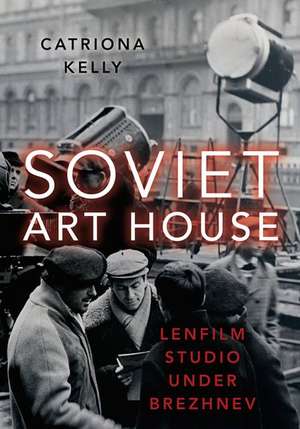Soviet Art House: Lenfilm Studio under Brezhnev
Autor Catriona Kellyen Limba Engleză Paperback – 30 mar 2021
| Toate formatele și edițiile | Preț | Express |
|---|---|---|
| Paperback (1) | 302.63 lei 10-16 zile | |
| Oxford University Press – 30 mar 2021 | 302.63 lei 10-16 zile | |
| Hardback (1) | 770.35 lei 31-37 zile | |
| Oxford University Press – 31 mar 2021 | 770.35 lei 31-37 zile |
Preț: 302.63 lei
Preț vechi: 318.94 lei
-5% Nou
Puncte Express: 454
Preț estimativ în valută:
57.92€ • 60.49$ • 48.02£
57.92€ • 60.49$ • 48.02£
Carte disponibilă
Livrare economică 10-16 ianuarie 25
Preluare comenzi: 021 569.72.76
Specificații
ISBN-13: 9780197548370
ISBN-10: 0197548377
Pagini: 536
Ilustrații: 90 illustrations and production stills
Dimensiuni: 251 x 175 x 33 mm
Greutate: 0.9 kg
Editura: Oxford University Press
Colecția OUP USA
Locul publicării:New York, United States
ISBN-10: 0197548377
Pagini: 536
Ilustrații: 90 illustrations and production stills
Dimensiuni: 251 x 175 x 33 mm
Greutate: 0.9 kg
Editura: Oxford University Press
Colecția OUP USA
Locul publicării:New York, United States
Recenzii
In Soviet Art House, Kelly takes a studio-centric approach to Soviet film history, looking at the Lenfilm Studio from the mid-1960s to the mid-1980s. This studio view provides an opportunity to look beyond common ways in which film historians viewed the Brezhnev years.
This deeply researched work is an extraordinarily innovative contribution to Soviet film studies. Kelly not only provides us with a comprehensive study of a vitally important film studio, one crucial to Soviet cultural endeavors, or pretensions, she also demonstrates how novel many of their offerings were.
There is nothing more difficult than writing about a past that has yet to become history. This richly-researched and truly outstanding book, written with zest and elegance, tells the story of the Lenfilm studio. Through art house Soviet cinema it immerses us in the Brezhnev era, as it opens up the door to the world of Soviet sensitivity and imagination to allow us to understand how the Soviet era was exhausted and why it ended.
In the years of Stagnation, Lenfilm studio was one of the symbols of artistic freedom in the USSR - with reservations, of course. Yet, there has not been a scholarly monograph dedicated to this seminal page in the history of Soviet culture - neither in Russia, nor outside the country. Catriona Kelly's book fills this deplorable gap. But, as a genuine work of history, it covers much more than that. It is a meticulous and pioneering study of the mechanics of Soviet film production, of the cultural politics in the murky period that would eventually lead to the collapse of the Union. But first and foremost, it is a tribute to some of the best films ever produced in one of the leading filmmaking countries, and to the filmmakers with their inevitably dramatic biographies.
To embark on making an art house movie under Brezhnev, the author shows with the clarity and insight of someone who spent years on studying the Lenfilm studio papers, was tantamount to submitting one's creative will to a variety of whims and whips—institutional and ideological. Every chapter in Kelly's book devoted to this or that art film reads like a perilous journey that ends in a miraculous survival.
This deeply researched work is an extraordinarily innovative contribution to Soviet film studies. Kelly not only provides us with a comprehensive study of a vitally important film studio, one crucial to Soviet cultural endeavors, or pretensions, she also demonstrates how novel many of their offerings were.
There is nothing more difficult than writing about a past that has yet to become history. This richly-researched and truly outstanding book, written with zest and elegance, tells the story of the Lenfilm studio. Through art house Soviet cinema it immerses us in the Brezhnev era, as it opens up the door to the world of Soviet sensitivity and imagination to allow us to understand how the Soviet era was exhausted and why it ended.
In the years of Stagnation, Lenfilm studio was one of the symbols of artistic freedom in the USSR - with reservations, of course. Yet, there has not been a scholarly monograph dedicated to this seminal page in the history of Soviet culture - neither in Russia, nor outside the country. Catriona Kelly's book fills this deplorable gap. But, as a genuine work of history, it covers much more than that. It is a meticulous and pioneering study of the mechanics of Soviet film production, of the cultural politics in the murky period that would eventually lead to the collapse of the Union. But first and foremost, it is a tribute to some of the best films ever produced in one of the leading filmmaking countries, and to the filmmakers with their inevitably dramatic biographies.
To embark on making an art house movie under Brezhnev, the author shows with the clarity and insight of someone who spent years on studying the Lenfilm studio papers, was tantamount to submitting one's creative will to a variety of whims and whips—institutional and ideological. Every chapter in Kelly's book devoted to this or that art film reads like a perilous journey that ends in a miraculous survival.
Notă biografică
Catriona Kelly is Professor of Russian at the University of Oxford and a leading historian of Russian culture and society. She is the author of numerous books on Russian modernism, gender history, the history of childhood, national identity, and the recent history of Leningrad/St Petersburg, some of which have been translated into Russian.
